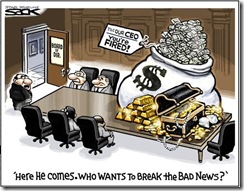A guest post today by Steve Fine (my dad) on the insurance industry and Executive pay…
 I was a part of the problem – well not a direct part, but in the industry. In the late 80’s, early 90’s, I found myself in the insurance industry. It was a time of innovation, probably still is and probably always will be. From my perspective it seemed like a game of cat and mouse. Laws were created by congress to create a sense of fairness and the brilliant minds of actuaries and lawyers would work to find loop holes.
I was a part of the problem – well not a direct part, but in the industry. In the late 80’s, early 90’s, I found myself in the insurance industry. It was a time of innovation, probably still is and probably always will be. From my perspective it seemed like a game of cat and mouse. Laws were created by congress to create a sense of fairness and the brilliant minds of actuaries and lawyers would work to find loop holes.
A law or ruling that limited the amount of benefits, (i.e. deferred compensation, company paid health plans etc), that the top earners of a company could be given different than the benefits given to the rank and file would be passed. Before most people were aware of the law the insurance and financial services industry would create a plan or program that could bypass the new law using a loop hole the legal department discovered. Would it be wrong to assume the law was created with the loop hole in mind?
This game laid the foundation for the disparity between top executives and regular workers. The following is from the website of the House Committee on Financial Services:
Wages for Regular Workers are Stagnant-Earnings for Top Executives Increase
“CEOs have seen increases in their earnings at a rate far greater than that of the average worker. In 1965, U.S. CEOs at major companies made 24 times a worker’s pay-by 2004, CEOs earned 431 times the pay of an average worker.[1] From 1995 to 2005, average CEO pay increased five times faster than that of average workers.[2] While CEO pay continues to increase at rates far exceeding inflation, wages for the vast majority of American workers have failed to keep up with rising prices. In fact, real wages for the 90% of Americans who earn under $92,000 a year have actually fallen since 2001.[3]
When comparing CEOs to minimum-wage earners, the contrast is even starker. In 2005, median pay for CEOs of the 100 largest companies rose 25% from the previous year.[4] Minimum-wage earners this year, on the other hand, made the same amount as last year, and every year before that since the 1996-1997 increase-adjusting for inflation they actually made less than then (in inflation-adjusted dollars, $5.15 today is the equivalent of only $3.95 in 1995). [5] CEOs, on average, take home 821 times as much as a person working for minimum wage.[6] With this extraordinary ratio, an average CEO makes more before lunch on his first day of work than a minimum-wage earner will make all year.”
While the insurance and financial services industry created the instruments which allowed legal manipulation of the laws, it instilled a sense of greed and changed the focus of business owners. Where once was pride of ownership, pride of making a product or providing a service and creating employment opportunities, now there is only a sense of making money, the more the better and the rest be damned.
Stay educated on all the reasons that the foundation of our free market economy is crumbling. That way you will know where to throw stones and when to duck.
The post doesn't really say what it is you did for the insurance industry, Steve, but I'll assume it was a higher paygrade than what I did. I'm pretty familiar with it, especially from the sales and claims sides. Part of the problem, at least to me, is how we set up scenarios where people will lie and cheat because most of their paycheck is based on commissions. Sales can be very financially rewarding, but too often a mindset takes over that justifies saying or doing anything since losing a sale is losing your income. Oversight by ethical superiors can help guard against this, but it seldom exists, in part because their financial success is tied to those beneath them.
Ariah, I continue to be impressed by the questions you ask.
Would it be fair to say that loopholes were either created or searched for because the laws themselves were unacceptable to the marketplace? Compensation being a private agreement between the owner or group of owners of a company and those who choose to be employed by that company, there really can be no winner or loser because no outside entity is forcing either party to an agreement against their will. This is true whether an employee is paid one million dollars or one dollar.
If the above is the case, then while individuals either party to or outside of that agreement may question its fairness there is no reason for either outrage or interference. The agreement either does not concern you or you have agreed to it of your own free will.